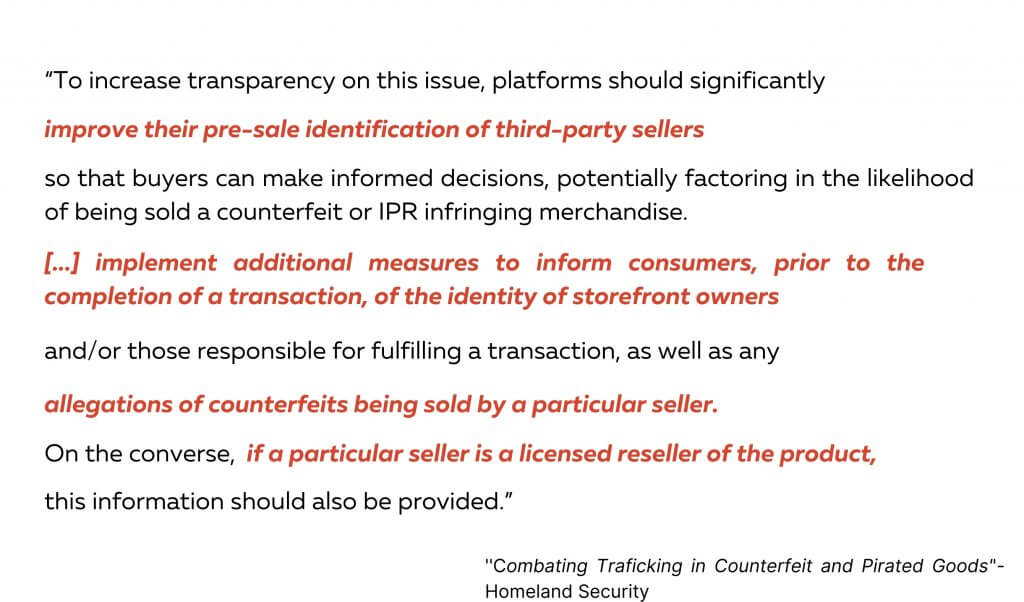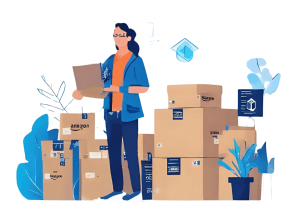
Whether or not you prefer the Amazon marketplace anonymous is a moot point. Due to recent policy changes, Amazon seller details can no longer be hidden on the US venue. In mere weeks, anonymous Amazon sellers will have to reveal their identities. But how much of your Amazon seller business information do you need to share? Find out here and now.
As we mentioned in the 7th edition of this year’s Amazon Seller News, merchants who don’t reveal their Amazon seller details on the US venue will see a major change next month. Sharing your Amazon seller business information is becoming compulsory, just as it already was for merchants in Mexico, Europe, and Japan.
What Prompted the Call for Amazon Seller Details?
Amazon launched its Counterfeit Crimes Unit on the Day One blog.
Soon after, it sent an Advance Notice. It said anonymous Amazon sellers will be a thing of the past come September.
According to Business Insider, the two may be connected and prompted by Homeland Security’s latest counterfeiting report.
However, the report’s findings should be taken with a grain of salt. It claims Operation Mega Flex – which carried out 20,861 inspections in Q3 2019 on shipments from online sellers based solely in China and Hong Kong – revealed a counterfeit rate of 5.1% for products shipped to the US.
Also, as the USPTO points, this data only refers to imported goods. It completely misses domestic counterfeit trade. Since the US border control agency only compiles cross-border data, there’s no real comparison to be made.
Still, cross-border counterfeiting is clearly on the rise, and platforms must act.
But Amazon.com sellers from China account for 37% of active accounts. And singling out Chinese sellers would be wrong. After all, China is a manufacturing powerhouse.
The Economist says 70% of the world’s mobile phones and 60% of shoes are made there. So, any new rules must apply to all sellers.
Why Does Amazon Seller Business Information Matter?
The report says counterfeiters piggyback on online marketplaces. That’s because startup, marketing, and distribution costs are lower. This leads to the erosion of consumer trust and brand integrity. But sharing seller information helps brand owners pursue counterfeits. And it also enables buyers to seek legal action.
To address all of these issues, the DHS came up with 10 private sector best practices.
Here’s a summary of what they say:
- Offer comprehensive ToS agreements detailing suspension and escalation procedures.
- Enhance vetting processes to weed out businesses banned from other platforms.
- Limit the sale of high-risk items (likely to be counterfeited, pirated, or health and safety hazards).
- Implement notice and takedown procedures on behalf of rights owners.
- Notify buyers and rights holders and remove counterfeit goods to avoid market re-entry.
- Require foreign sellers to provide security for US customers (e.g. insurance, compensation).
- Encourage sellers to bank with financial institutions that comply with US disclosure laws.
- Provide pre-sale seller identification.
- Provide marketplace seller ID.
- Disclose the item’s country of origin.
Why Focus on Anonymous Amazon Sellers?
Point 8 above refers to actions online platforms must take to make sure customers know who they’re buying from.
This includes revealing whether sellers have the right to sell and if they have previous counterfeiting offenses.
But it all starts with sharing the identity of sellers, as mentioned below:

Will Amazon Marketplace Anonymous Sellers Be Banned?
It’s hard enough for buyers to tell Amazon and FBA sellers apart in the age of the Buy BoxThis refers to the situation where a sel… More.
Imagine falling prey to a seller with a store name similar to yours. Publicly displaying business names and addresses on the website might thwart counterfeiters from upstaging honest sellers.
But what’s to stop a counterfeiter from doubling down?
They could use a similar address to yours. They could even change their company name to match yours almost perfectly.
So, sellers can still hide behind anonymity.
That is unless Amazon individually vets storefronts regularly. And that’s unlikely.
What Kind of Amazon Seller Business Information Will Be Shared?
Tax and contact details aren’t necessary.
It’s only the name and address of the business or individual who owns the account that will be shared automatically.
Still, with foreign subsidiaries, contractors, and offshore companies, that kind of information might be meaningless if it’s hard for US buyers to check it.
Also, foreign sellers and individuals with privacy concerns can come up with makeshift solutions to win over US buyers. They can set up a P.O. Box or UPS Store mailbox. They can rent a virtual office address and have their mail forwarded to them. And they can even buy an ‘off the shelf’ company.
How to Share Your Amazon Seller Details
Login to your account in Seller CentralAmazon Seller Central is a portal or a h… More, and go to the Settings menu.
Under Account Info, you’ll find the Seller Account Information page.
Then click “Business Address” and “Display Name” (fka “Legal Entity”) in the Business Information section, as shown in this tutorial.
Don’t forget to click Submit.
Bear in mind that the Notice specifically mentions consistency. The aim here is to “ensure there is a consistent baseline of seller information”.
So, the Amazon seller business information uploaded in Seller CentralAmazon Seller Central is a portal or a h… More should match the corporation directory or overseas company register (which buyers can check).
Amazon also specifically asks sellers not to enter their email address.
They should use the Buyer-Seller messaging platform instead.
Sellers who don’t comply can be caught red handed with an email hook. In which case, Amazon will promptly suspend their account for trying to divert buyers.
So, Amazon.com is trying to put an end to the business of selling counterfeits on its website under the cover of anonymity.
But it remains to be seen if this leads to changes in buyer behavior. And if so, whether anonymous Amazon sellers stand to lose.
Meanwhile, why not double-check your Amazon seller details, just to be safe?

Melanie takes an active interest in all things Amazon. She keeps an eye on the latest developments and keeps Amazon sellers up to speed.





One Response
It is a good way that can protect honest sellers, actually, there are a lot of illegal matters that hurt honest sellers.